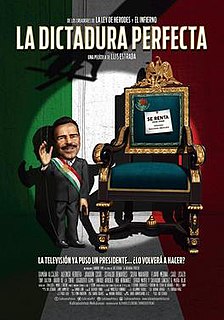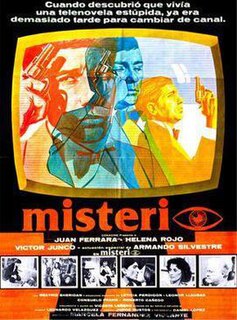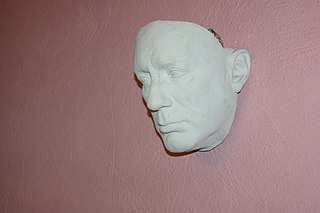
Bruno Bichir Nájera is a Mexican actor and one of the members of the Bichir family.

Zaide Silvia Gutiérrez is a Mexican actress whose breakout role was the 1983 film El Norte.

Ignacio López Tarso is a Mexican actor of stage, film and television. He has acted in about 50 films and appeared in documentaries and in one short feature. In 1973 he was given the Ariel Award for Best Actor for Rosa Blanca, and the Ariel de Oro lifetime achievement award in 2007. He has also been honored multiple times at the TVyNovelas Awards.

Fanny Schiller Hernández (1901–1971) was an award-winning Mexican character actress, television star and also acted in operettas and musicals in the Golden Age of Mexican cinema. She won two Ariel Awards for best supporting actress and was nominated for two additional films. She was a social activist, creating the Actor's Union and inspiring the creation of “Rosa Mexicano”. She was accomplished at dubbing and was the voice of many animated characters as well as the official voice of several other notable Mexican actresses.

Leonor Llausás was a Mexican television and film actress who appeared in over 100 works of film and television. She was nominated multiple times for the Ariel Awards and won a Best Actress award in 1955 from the film Los Fernandez we peralvillo, in 1975 won Diosa de Plata for Las poquianchis. She also was awarded the "Virginia Fabregas" medal of honor by the Mexican National Association of Actors.

The Perfect Dictatorship is a 2014 Mexican comedy political satire film, written, produced and directed by Luis Estrada and starring Damián Alcázar, Alfonso Herrera, Joaquín Cosío, Dagoberto Gama, María Rojo and Salvador Sánchez. Cast also includes Osvaldo Benavides, Saúl Lisazo, Tony Dalton, Arath de la Torre, Sergio Mayer and Itatí Cantoral. It was released on October 16, 2014, and it will represent Mexico at the 2015 Goya Awards.
Luis Mario Cayetano Spota Saavedra Ruotti Castañares was a Mexican writer, journalist, boxing official and film director.

Misterio (Mystery) is a 1980 Mexican thriller film, directed and written by Marcela Fernández Violante. The film stars Juan Ferrara, as a TV star who blurs reality with the plot of the soap opera he is shooting. Helena Rojo plays Sandra, his co-star, while Víctor Junco is the TV director and Beatríz Sheridan is the screenwriter. Misterio is adapted from a novel written by Vicente Leñero, who adapted it for the screen. The film received eight Ariel Awards in 1980, including Best Actor (Ferrara), Best Actress (Rojo), Best Supporting Actor (Junco), and Best Supporting Actress (Sheridan).
The Ariel Award for Best Actor is an award presented by the Academia Mexicana de Artes y Ciencias Cinematográficas (AMACC) in Mexico. It is given in honor of an actor who has delivered an outstanding performance in a leading role while working within the Mexican film industry. In 1947, the 1st and 2nd Ariel Awards were held, with Domingo Soler and David Silva winning for the films La Barraca and Campeón Sin Corona, respectively. With the exception of the years 1959 to 1971, when the Ariel Awards were suspended, the award has been given annually. Nominees and winners are determined by a committee formed every year consisting of academy members, previous winners and individuals with at least two Ariel nominations; the committee members submit their votes through the official AMACC website.
The Ariel Award for Best Supporting Actor is an award presented by the Academia Mexicana de Artes y Ciencias Cinematográficas (AMACC) in Mexico. It is given in honor of an actor who has delivered an outstanding performance in a supporting role while working within the Mexican film industry. In 1947, the 1st and 2nd Ariel Awards were held, with José Baviera and Fernando Soto winning for the films La Barraca and Campeón Sin Corona, respectively. With the exception of the years 1958 to 1971, when the Ariel Awards were suspended, the award has been given annually. Nominees and winners are determined by a committee formed every year consisting of academy members, previous winners and individuals with at least two Ariel nominations; the committee submit their votes through the official AMACC website.
The Ariel Award for Best Supporting Actress is an award presented by the Academia Mexicana de Artes y Ciencias Cinematográficas (AMACC) in Mexico. It is given in honor of an actor who has delivered an outstanding performance in a supporting role while working within the Mexican film industry. In 1947, the 1st and 2nd Ariel Awards were held, with Lilia Michel winning in both ceremonies for the films Un Beso en la Noche and Vértigo, respectively. With the exception of the years 1959 to 1971, when the Ariel Awards were suspended, the award has been given annually. Nominees and winners are determined by a committee formed every year consisting of academy members, previous winners and individuals with at least two Ariel nominations; the committee members submit their votes through the official AMACC website.

La Víspera is a 1982 Mexican political drama film, directed by Alejandro Pelayo. The film received four Ariel Awards in 1983: Best Actor, Best Supporting Actor, Best Original Screenplay and Best First Feature Film. The film plot recount 24 hours before engineer Manuel Miranda takes office as Secretary of State in Mexico.
The 38th Ariel Awards ceremony, organized by the Mexican Academy of Film Arts and Sciences (AMACC) took place on July 22, 1996, in Mexico City. During the ceremony, AMACC presented the Ariel Award in 25 categories honoring films released in 1995. Sin Remitente received four awards out of 14 nominations, including Best Picture and Best Director for Carlos Carrera. La Reina de la Noche was the most awarded film with six awards; La Línea Paterna and Sobrenatural with three; Dulces Compañías, El Anzuelo and Mujeres Insumisas with two; and Entre Pancho Villa y Una Mujer Desnuda, Domingo Siete, De Tripas, Corazón, and El Abuelo Cheno y Otras Historias with one.

Por Si No Te Vuelvo a Ver is a 1997 Mexican drama film, directed by Juan Pablo Villaseñor and produced by the Centro de Capacitación Cinematográfica. The film received eight Ariel Awards in 1998 including Best Picture, Best Director, Best Actor and Best Actress.
The 59th Ariel Awards ceremony, organized by the Mexican Academy of Film Arts and Sciences (AMACC) took place on July 11, 2017, at the Palacio de Bellas Artes in Mexico City. During the ceremony, AMACC presented the Ariel Award in 27 categories honoring films released in 2016. The ceremony will be televised in Mexico by Canal 22.

The 60th Ariel Awards ceremony, organized by the Mexican Academy of Film Arts and Sciences (AMACC) took place on June 5, 2018, at the Palacio de Bellas Artes in Mexico City. During the ceremony, AMACC presented the Ariel Award in 26 categories honoring films released in 2017. The ceremony was televised in Mexico by Canal 22.

Héctor Ortega Gómez is a Mexican film, television, and theater actor. He is also a screenwriter and a director.












